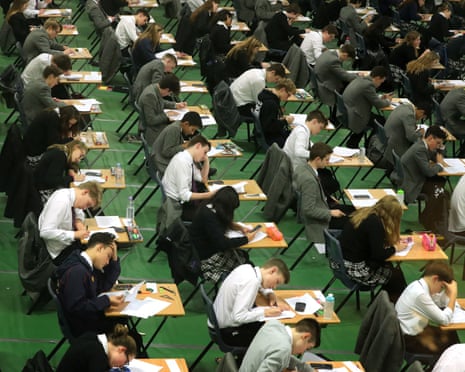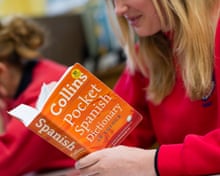Compulsory maths and English GCSE resits too inflexible, says curriculum chief

Compulsory maths and English GCSE resits too inflexible, says curriculum chief
Becky Francis says pupils condemned to retaking maths and English face ‘blocks to progress’ and system needs overhaul
The requirement that children who fail GCSE maths and English must repeatedly resit the exams is too inflexible and needs to be overhauled, according to Becky Francis, the head of the government’s curriculum review.
Francis said the full review, ordered by the education secretary, Bridget Phillipson, would be published “in a few weeks” and supports changes expected in a forthcoming white paper to England’s resits policy that requires pupils who fail to reach a grade 4 in maths and English to keep retaking them while in post-16 schooling.
Francis, a professor of education at University College London, told a conference of school leaders that those who fail maths and English are being condemned to face “blocks to progress” and repeated discouragement.
Calling for “a more nuanced, evidence-driven approach at post-16, rather than an inflexible approach to retakes”, Frances highlighted that out of 3,400 17-year-olds awarded a grade 2 in GCSE maths during the summer of 2024, only about 50 achieved a grade 4 in their resits later that year.
“The cost, both to young people’s morale and to the public purse, must be significant. So we’re making recommendations which we hope will better support more young people to make good progress post-16, and these will be reflected in the forthcoming skills white paper,” Francis said.
The compulsory resits have been condemned by education experts. Jill Duffy, the former chief executive of the OCR examination board, said the level of resits has turned into a crisis, with the performances revealing that the students lacked “fundamental skills they should have been getting much earlier” at school.
MPs on the House of Commons’ education select committee have also urged the government to change the policy introduced by the former education secretary Michael Gove.
Pepe Di’Iasio, the general secretary of the Association of School and College Leaders, said: “While we fully agree with the importance of supporting students who have struggled with maths and English when they enter 16-19 education, the fact of the matter is that the existing policy of mandatory retakes simply hasn’t worked.
“Most of these students continue to fall short of grade 4 at GCSE and this is a grinding experience which erodes their confidence in these vital subjects – the exact opposite of the policy intention. It is very clear that a new approach is needed and it is pleasing to hear that this is on the cards.”
The government is expected to publish its post-16 skills white paper early next week, including plans for a new vocational qualification for sixth formers to sit alongside A-levels and T-levels, likely to be known as V-levels.
after newsletter promotion
Francis said: “We see the need for a third vocational pathway alongside the academic and technical pathways offered by A-levels and T-levels. And of course, a strong offering is especially important to support the large numbers of young people seeking such routes, among whom those from socioeconomically disadvantaged backgrounds are disproportionately represented.”
The new V-levels would in effect displace alternative A-level qualifications such as BTecs or other applied general qualifications offered by exam boards.
Di’Iasio said: “The challenge will be to develop a policy which gives every student the best possible opportunity of a qualification of which they can be proud and provides pathways into higher education, apprenticeships and careers.”
Explore more on these topics- GCSEs
- Exams
- National curriculum
- Vocational education
- Schools
- Academies
- Curriculums
- news

A-levels and GCSEs need overhaul to keep pace with generative AI, experts say

Au revoir to French: Spanish becomes most popular language GCSE

GCSE results: joy at Maesteg school, but Wales still lagging behind England

GCSE results: pupils in England bounce back from pandemic as top grades rise

Students who use keyboards in exams get better scores, research finds

Ofqual admits massively exaggerating number of students getting exam assistance

Italian and Polish GCSEs to go digital in 2026, says England’s largest exam board

GCSE results fall in England after anti-grade inflation plans forced through